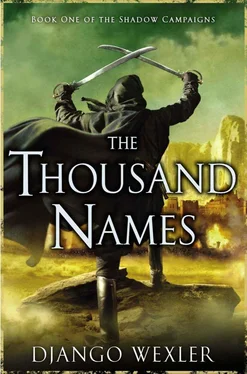Django Wexler - The Thousand Names
Здесь есть возможность читать онлайн «Django Wexler - The Thousand Names» весь текст электронной книги совершенно бесплатно (целиком полную версию без сокращений). В некоторых случаях можно слушать аудио, скачать через торрент в формате fb2 и присутствует краткое содержание. Жанр: Фэнтези, на английском языке. Описание произведения, (предисловие) а так же отзывы посетителей доступны на портале библиотеки ЛибКат.
- Название:The Thousand Names
- Автор:
- Жанр:
- Год:неизвестен
- ISBN:нет данных
- Рейтинг книги:4 / 5. Голосов: 1
-
Избранное:Добавить в избранное
- Отзывы:
-
Ваша оценка:
- 80
- 1
- 2
- 3
- 4
- 5
The Thousand Names: краткое содержание, описание и аннотация
Предлагаем к чтению аннотацию, описание, краткое содержание или предисловие (зависит от того, что написал сам автор книги «The Thousand Names»). Если вы не нашли необходимую информацию о книге — напишите в комментариях, мы постараемся отыскать её.
The Thousand Names — читать онлайн бесплатно полную книгу (весь текст) целиком
Ниже представлен текст книги, разбитый по страницам. Система сохранения места последней прочитанной страницы, позволяет с удобством читать онлайн бесплатно книгу «The Thousand Names», без необходимости каждый раз заново искать на чём Вы остановились. Поставьте закладку, и сможете в любой момент перейти на страницу, на которой закончили чтение.
Интервал:
Закладка:
“Three thousand, perhaps four.”
The general snorted. “What can they hope to accomplish with so small a force? Can they be mad enough to believe they will defeat the Redemption? My Auxiliaries alone outnumber them.”
The Ghost shrugged.
“Perhaps they mean to simply hold Sarhatep,” Yatchik said. “If so, they are welcome to it. There is nothing of value so far down the coast.”
“They cannot be allowed to retain a foothold,” Khtoba said. “We must soak the sand in Vordanai blood and pack a ship full of their heads to send back to their king. He must understand the folly of sending armies against us.”
“Then,” Yatchik said, soft as a snake, “will you march against them?”
Khtoba froze. Jaffa saw the trap. The general was more afraid of the priests than of the foreigners. If he marched his strength away from the city and weakened himself in battle, there was no guarantee he would find a friendly welcome on his return.
“My friends,” Jaffa said, “the city is restless. Not all have accepted the Redemption. It may be that the raschem will simply wait, and if they do, I suggest that we do the same.”
“Yes,” said Khtoba. “My men are needed to keep order.”
In truth, the drunken soldiers of the Auxiliaries were more of a detriment to public order than a help in keeping the peace, but Jaffa knew better than to say so. Yatchik smiled.
“In that case, General, you are in accord with my own views.”
Khtoba grunted, conceding the point. Jaffa turned to the Ghost.
“Can we rely on you to keep us informed as to the foreigners’ movements?”
Malik-dan-Belial inclined his masked head slightly. “However,” he said, “I do not believe they will stay at Sarhatep.”
“Why?” said the general, anxious to be done with this council.
“Among the thousands, there is one who possesses true power. An abh-naathem . Such people do not cross the oceans to no purpose.”
Khtoba snorted. “So the Vordanai have sent us a wizard, then? We’ll see if his spells make him proof against cannonballs.”
“The power of the gods will overcome any raschem magic,” Yatchik said. “Those who trust in the Redemption need have no fear of spells or demons.”
The Ghost only shrugged again.
Stripped of his painted cloak and staff of office, the Grand Justice passed into the slums of Ashe-Katarion as the sun sank toward the horizon. He wore the garb of a common trader, a plain brown wrap belted with a rope, and a heavy cudgel swung from his hip.
There were parts of the city to which the writ of the prince’s Justices had never extended, except in name, and this was one of them. Once there had been an informal accord between those who enforced the law and those who flouted it. The criminals kept their operations quiet and orderly, and made certain that the bodies found floating down the river never belonged to anyone wealthy or important. In return, the Justices turned a blind eye to their activities.
That peace had gone by the board with the coming of the Redemption, along with all the other unwritten rules that made the ancient city work. Some of the slums had practically emptied as the desperate poor flocked to the Redeemers’ banners. Others had become armed camps, with raids and counterraids leaving corpses that lay in the street for days to be torn by packs of feral dogs.
Jaffa therefore kept one hand on his cudgel, and shot hard looks at the unwashed children who watched him from doors and alleyways. The few adults he saw were hurrying along, eyes down, intent on their own errands. This slum, known for reasons understood only by historians as the Hanging Garden, was one of those that had seen the greatest concentration of Redeemer fervor. The dwellings of those who had left to follow the holy flame had been rapidly colonized by the city’s enormous population of vagrant youths, always in search of someplace to sleep where they wouldn’t be bothered by thieves, pimps, or Justices.
Along with the squatters had come others who wished to hide from Ashe-Katarion’s new rulers. Jaffa turned off the main street, a hard-packed dirt road pocked with occasional half-buried paving stones, and into a narrow alley. This ran on for some time, twisting and turning, and eventually opened out into an irregular courtyard.
Here, some of Ashe-Katarion’s ancient architecture had survived the attentions of the years and the insatiable demand for cut stone. A broad fountain stood in the center, dusty dry now, watched over by a weathered stone god with arms spread in an attitude of benediction. Erosion had blurred his features until he was unrecognizable. Uneven flagstones still floored the rest of the yard, with hard, wiry grass pushing up through the cracks between them.
It was here, in this hidden yard, that the last true servants of the gods waited. Jaffa approached the wicker chair set beside the fountain and fell to his knees, head lowered.
“Welcome, child.” The figure in the chair was cloaked and hooded, despite the spring heat, and her hands were swathed in white bandages. Her voice was desiccated, cracked and dry, like the very voice of the desert.
“Holy Mother,” Jaffa said, keeping his eyes on the broken flagstones, “I have news from the council.”
“You bring more than news, it seems.” There was a dusty sound from the cloaked woman that might have been a laugh. “Onvidaer, bring me our guest.”
There was a startled squeak from behind Jaffa, and the shuffling of sandals. The Grand Justice remained in his attitude of obeisance, sweat beading on his face. “I am sorry beyond words, Mother. I did not think-”
“Rise, child,” the cloaked woman said. “No harm has been done. Now let us see what fish our net has caught.”
Jaffa got to his feet and turned, weak with relief. Standing behind him was a young woman of fifteen or sixteen, scrawny and stick-limbed. Her skin was smudged with the filth of the slums, and she wore only torn trousers and a dirty vest. Her hair hung in thick, greasy clumps.
Onvidaer had one hand on the girl’s upper arm, holding her still without apparent effort. He was a young man, only a few years older than his prisoner, but lean and well muscled, with the copper-gray skin of the Desoltai. He wore nothing but a loincloth, showing broad shoulders and a muscular chest to good effect, and his face was round, almost cherubic. His other hand held a thin-bladed dagger.
“She followed Jaffa,” he announced. “For some time before he came here. But she has reported to no one.”
“Such a ragged little alley cat,” rasped the woman in the chair. “But what house does she belong to, I wonder?”
“No one,” the girl said. Her eyes were full of defiance. “I’ve done nothing, I swear it. I never followed him.”
“Now, now,” the woman said. “Cool your anger. Were I in your position, I might do better to beg for mercy.”
“I don’t know who you are, or. . or anything!”
“We will find out the truth of that soon enough.” The hood turned. “Summon Akataer.”
A huge shadow detached itself from the wall behind the old woman, resolving into an enormous, hairless man in leather breeches and straps. He gave an assenting grunt and wandered out through the rear of the square, where empty doorways gaped into long-deserted apartments.
“Now, child,” the old woman said. “Who sent you here?”
“No one sent me!” she said, jerking at Onvidaer’s grip. “And I’m not a child.”
“All men are children of the gods,” the old woman said, not unkindly. “And all women, too, even little alley cats. The gods cherish all their children.”
“Just let me go.” There was desperation in the girl’s voice, and Jaffa had to harden his heart. “Please. I won’t tell anyone anything-”
Читать дальшеИнтервал:
Закладка:
Похожие книги на «The Thousand Names»
Представляем Вашему вниманию похожие книги на «The Thousand Names» списком для выбора. Мы отобрали схожую по названию и смыслу литературу в надежде предоставить читателям больше вариантов отыскать новые, интересные, ещё непрочитанные произведения.
Обсуждение, отзывы о книге «The Thousand Names» и просто собственные мнения читателей. Оставьте ваши комментарии, напишите, что Вы думаете о произведении, его смысле или главных героях. Укажите что конкретно понравилось, а что нет, и почему Вы так считаете.











